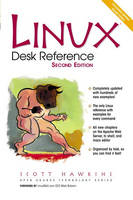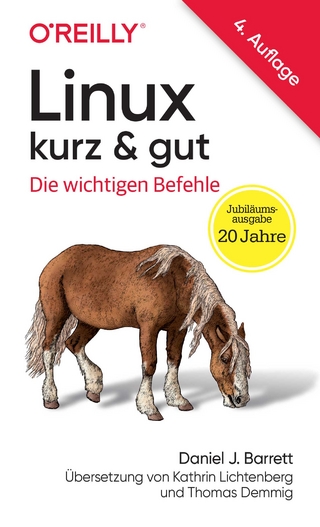
Linux Desk Reference
Prentice Hall (Verlag)
978-0-13-061989-1 (ISBN)
- Titel ist leider vergriffen;
keine Neuauflage - Artikel merken
This handy 6"x9" Linux desk reference packs information about every command Linux users will need -- organized for maximum value and convenience. In this brand-new Second Edition, Scott Hawkins has refreshed entries throughout, and added four new chapters -- including all-new coverage of the tc shell, Emacs editor, and Apache Web server.KEY TOPICS:Unlike some Linux references, Linux Desk Reference is organized by function, so new Linux users can find what they're looking for fast -- and a great "roadmap-style" alphabetical reference gets experts the information they need just as quickly. The book's coverage is exceptionally broad, ranging from files, processes, I/O, and user accounts through networking, security, and Windows connectivity. Every chapter begins with a brief discussion of relevant terms and concepts, followed by a brief summary of all relevant commands, a list of related files, and then a complete listing of the commands, complete with options and examples. This is the only Linux reference that contains real-world examples for every command; in many cases, it even provides diagrams and sample output.MARKET:For all Linux users who need a quality, complete Linux reference -- including beginners, power users, developers, and sysadmins.
SCOTT HAWKINS has been a Linux user since 1992. He is a systems administration consultant and resides in Atlanta, GA. He is the author of Apache Web Server Administration & E-Commerce Handbook and with Ellie Quigley, he is co-author of The Complete Linux Shell Programming Training Course (PTG Interactive).
Acknowledgments.
Introduction.
1. Documentation.
apropos, info, locate, makewhatis, man, updatedb, whatis, whereis.
I. SYSTEM STRUCTURES.
2. Files.
chgrp, chmod, chown, cksum, cp, dd, file, install, ln, lockfile, ls, mv, pathchk, rm, stat, sum, symlinks, touch.
3. Process.
&, ^, bg, fg, fuser, fuser, fuser -V, jobs, kill, kill -l, killall, nice, nohup, pidof, ps, pstree, renice, top.
4. Standard Input, Output, and Error.
>, <, 2>, >>, |, tee, script, xargs.
5. Directories.
cd, mkdir, pwd, rmdir, symlinks.
6. Users.
chfn, chpasswd, finger, groupmod, groups, grpck, id, passwd, pwck, su, useradd, useradd -D, userdel, usermod, users, who.
7. Paths.
basename, dirname, namei, pathchk.
8. The Bash Shell.
alias, unalias, history, let, EXPRESSION, until, while, for, test, pushd, popd, dirs.
9. The TC Shell.
history, history, history, dirs, popd, pushd, exec, bg, exec, command, fg, hup, jobs, kill, kill-l, limit, migrate, migrate, nohup, notify, onintr, sched, sched -n, stop, suspend, time, unlimit, wait, alias, unalias, pattern, break, breaksw, case, continue, default, eval arg ..., foreach name ((wordlist)), ..., end, filetest -op file ..., goto word, repeat count command, shift, endsw, while, ..., end, bindkey, bindkey, bindkey, settc cap, value, setty, telltc, alloc, built-ins, chdir, echo, exit, hashstat, inlib, log, login, logout, ls-F, newgrp, printenv, rehash, rootnode, set, set name ..., set name=word ..., set, set name, setenv, source, umask, unhash, unset, unsetenv, watchlog, where, which.
10. Terminal and Keyboard.
captoinfo, clear, dumpkeys, getkeycodes, getty, infocmp, loadkeys, login, setterm, stty, tic, tput, tset, reset.
11. Disks.
badblocks, cfdisk, du, fdformat, fdisk, quota, setfdprm.
12. Filesystems.
debugfs, df, dumpe2fs, e2fsck, fsck, fsck.minix, fuser, lsattr, lsof, mkfs, mkfs.minix, mklost+found, mkswap, mount, mountd, rdev, /sbin/swapoff, /sbin/swapon, sync, tune2fs, umount.
13. Printers and Print Queues.
lpc, lpd, lpq, lpr, lprm, pr, tunelp.
14. Daemons.
fingerd, ftpd, gated, gdc, /usr/sbin/ , in.identd, /usr/etc/imapd, inetd, klogd, lpd, /usr/sbin/ , rpc.mountd named, /usr/sbin/, rpc.nfsd, pppd, rexecd, rlogind, rshd, rwhod, syslogd, talkd, tcpd, /usr/sbin/, in.telnetd, tftpd, rpc.yppasswdd, rpc.yppasswdd.
15. Machine Information.
arch, hostname, hwclock, uname.
16. Kernel.
depmod, depmod, depmod, modprobe, modprobe, modprobe, modprobe, modprobe, modprobe insmod, kerneld, ksyms, lsmod, bdflush, rmmod.
II. MANIPULATING DATA AND TEXT FILES.
17. Displaying Files.
cat, head, head, less, look, rev, tac, tail.
18. Comparing and Merging Files.
comm, cmp, diff, diff3, sdiff.
19. Data Files.
colrm, column, csplit, cut, expand, fmt, fold, merge, paste, sort, tr, unexpand, uniq.
20. Document Formatting.
colcrt, eqn, gs, groff, grog, gxditview, tbl, tex, troff, xdvi.
21. The vi Editor.
22. Emacs.
23. Archiving and Compression.
compress, uncompress, cpio, dump, gzexe, gzip, gunzip, restore key, shar, shar -S, tar, unshar, uuencode, zcmp, zdiff, zgrep, zmore, znew.
III. COMMON TASKS.
24. Startup and Shutdown.
dmesg, halt, reboot, poweroff, lilo, rdev, ramsize, rootflags, runlevel, shutdown, swapon, swapoff, sync, init, telinit.
25. X Window System.
XF86Setup, XF86Setup, X, startx, SuperProbe, xdm, xf86config, xinit, xmseconfig, xterm, xvidtune.
26. Scheduling.
at, atq, atrm, batch, crontab, crontab, sleep, usleep.
27. Finding Stuff.
find, finger, grep, locate, updatedb, which progname ....
28. Diagnostics and System Performance.
df, dmesg, free, ipcs, pstree, runlevel, tload, top, vmstat, vmstat, who.
29. Security.
ipfwadm, pgpe, pgpk, pgps, pgpv.
30. Miscellaneous.
cal, date, date, fortune, ispell, printf, rpm, strfile.
IV. NETWORKING.
31. TCP/IP.
arp, bootpd, bootptab, bootpgw, bootptest, dip, diplogin, diplogini, hostname, gated, gdc, ifconfig, netstat, Ouput Description, nslookup, rmail user ..., route, routed, /etc/gateways, rusers, tcpdchk, tcpdmatch, tcpdmatch, traceroute.
32. Networking Applications.
ftp, hostname, netstat, ping, rarp, rcp, rdate, rdist, rlogin, rsh, rusers, rwho, telnet, tftp.
33. NIS and NFS.
hostname, domainname, dnsdomainname, nisdomainname, ypdomainname, /usr/lib/yp/makedbm, /usr/sbin/ypbind, ypcat, yppasswd, ypchfn, ypchsh, /usr/lib/yp/ypinit, ypmatch, yppoll, /usr/sbin/yppush, /usr/sbin/ypserv, ypset, ypwhich, /usr/lib/yp/ypxfr.
34. DOS and Windows Connectivity.
mattrib, mbadblocks DRIVE:, mcd, mcopy, mdel, mdeltree, mdu, mformat, mlabel, mmd, mrd, mmove, mmove, mtype, xcopy, nmbd, smbclient servicename, smbmount, smbd, smbumount, smbstatus, testparm.
35. Mail and Other Communication.
biff, elm, elm, fetchmail, fetchmailconf, formail, mail, makemap, mesg, mimencode, rmail, rwall, sendmail, newaliases, mailq, talk user, uuencode, uudecode, wall, write.
36. Apache.
ServerType, Port, HostnameLookups, User & Group, BrowserMatch, ServerAdmin, ServerRoot, BindAddress, ErrorLog, TransferLog, PidFile, CacheNegotiatedDocs, Timeout, KeepAlive, MaxKeepAliveRequests, KeepAliveTimeout, MinSpareServers, MaxSpareServers, StartServers, MaxClients, MaxRequestsPerChild, , Location, Options, AllowOverride, order, allow, deny, DocumentRoot, UserDir, DirectoryIndex, FancyIndexing, AddDescription, ReadmeName, HeaderName, IndexIgnore, AccessFileName, DefaultType, AddLanguage, LanguagePriority, ScriptAlias, AddHandler.
Appendix A.
Glossary.
Index.
| Erscheint lt. Verlag | 4.9.2001 |
|---|---|
| Verlagsort | Upper Saddle River |
| Sprache | englisch |
| Maße | 228 x 151 mm |
| Gewicht | 712 g |
| Themenwelt | Schulbuch / Wörterbuch ► Lexikon / Chroniken |
| Informatik ► Betriebssysteme / Server ► Unix / Linux | |
| ISBN-10 | 0-13-061989-2 / 0130619892 |
| ISBN-13 | 978-0-13-061989-1 / 9780130619891 |
| Zustand | Neuware |
| Haben Sie eine Frage zum Produkt? |
aus dem Bereich


